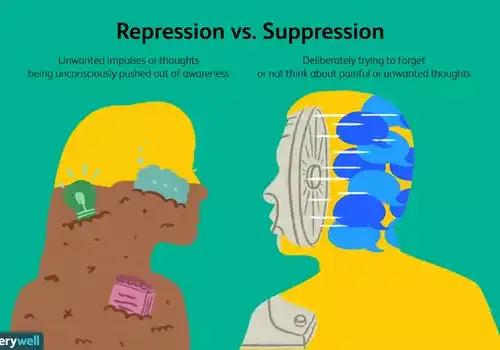How Does Repression Work in Our Unconscious Mind?
Curated from: verywellmind.com
Ideas, facts & insights covering these topics:
8 ideas
·2.28K reads
17
Explore the World's Best Ideas
Join today and uncover 100+ curated journeys from 50+ topics. Unlock access to our mobile app with extensive features.
Repression: A Primer
Repression in psychological terms is a defence mechanism that involves keeping our feelings, thoughts and urges out of our conscious awareness. Our unacceptable desires are kept away from our consciousness so that we are less anxious.
It is a process by which painful and disturbing thoughts are intentionally hidden, and was first identified by Sigmund Freud. He compared the mind to an iceberg, where only the tip is visible and the major portion is hidden.
63
367 reads
The Conscious And The Unconscious
The visible aspects of our mind consist of the thoughts, feelings and memories that we are aware of, and are in the conscious mind. The impulses, desires, memories and thoughts below the surface, are out of sight and reside in the unconscious mind.
Repression was a crucial finding for Freud, as the entire concept of psychoanalysis rested on the fact that unconscious and repressed feelings are blocking the mind of the person and leading to psychological distress.
56
306 reads
Repression Vs Suppression
Suppression (often confused with repression) is a type of defence mechanism, where a person consciously tries to forget or not think of certain unwanted impulses or thoughts.
With repression, this activity happens automatically without any conscious effort or intention.
56
297 reads
Types Of Repression
- Primary repression is when unwanted impulses are hidden even before it reaches consciousness, and happens entirely in the unconscious mind. There is almost no awareness of the repression activity on the individual.
- Repression proper is when a person becomes aware of the impulses and desires that are repressed, but still intentionally tries to remove it from awareness. This ‘selective forgetting’ is a way for people to block awareness of unwanted memories, especially the traumatic ones.
61
234 reads
Parts Of Our Personality, According To Freud
Our Personality, according to Sigmund Freud, has three components:
- The Ego: The main conscious component of the brain that acts as an interface between reality and the other two aspects of our personality listed below.
- The Id: The invisible, unconscious reservoir of our desires and urges that drive our basic behaviour.
- The Superego: The idealistic and moralistic side of our personality that includes our conscience.
69
275 reads
Hail To The Ego
The ego strives to balance the two aspects of our personality, the hidden desires and the idealistic conscience.
The repressed desires and impulses can simmer inside and come out in the form of dysfunctional behaviour and phobias.
57
297 reads
Repression And Dreams
Repressed feelings can also pop up in our dreams, and the specific events that happen in the dream world. Analysing dreams, a speciality of Sigmund Freud, results in a lot of hidden impulses being revealed.
One can also find repressed content in fears, slips of the tongue and feelings towards our loved ones, something known as the Oedipus Complex.
59
249 reads
Repression And Memory
Memories aren’t set in stone like we all believe and can be repressed, suppressed and even falsified. Imagination, dreams and past memory feel similar to the mind.
Memory repression, false memories, and amplified memories (vividly repeating a traumatic experience) can be a result of trauma, leading to Post-Traumatic Stress Disorder.
59
258 reads
IDEAS CURATED BY
Fiona I.'s ideas are part of this journey:
Learn more about health with this collection
Techniques for brainstorming and generating new ideas
The power of collaboration and feedback in the creative process
How to recognize and overcome limiting beliefs
Related collections
Similar ideas
6 ideas
Repression as a Defense Mechanism
verywellmind.com
5 ideas
The Structure and Levels of the Mind According to Freud
verywellmind.com
7 ideas
Freud's Id, Ego, and Superego Explained
thoughtco.com
Read & Learn
20x Faster
without
deepstash
with
deepstash
with
deepstash
Personalized microlearning
—
100+ Learning Journeys
—
Access to 200,000+ ideas
—
Access to the mobile app
—
Unlimited idea saving
—
—
Unlimited history
—
—
Unlimited listening to ideas
—
—
Downloading & offline access
—
—
Supercharge your mind with one idea per day
Enter your email and spend 1 minute every day to learn something new.
I agree to receive email updates

